Lees onze recente magazine-artikelen
Om het jaar goed af te sluiten (of te beginnen), hebben we al onze magazine-artikelen van augustus tot december 2022 voor je op een rijtje gezet. Zo kun je ze tijdens je kerstvakantie nog eens rustig nalezen. In elk artikel vertelt een onderzoeker van de RUG over zijn of haar vakgebied.

Muziektoerisme: van Abbey Road tot Zoutelande
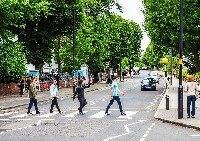
Abbey Road, Graceland, Père-Lachaise. Het zijn plekken die meteen gedachten oproepen aan muziek of muzikanten. Als door muziek plekken en gevoelens elkaar innig omarmen en een intieme dans aangaan, ontstaat muziektoerisme, een groeiende industrie. En zo werd ‘Zoutelande’ van Bløf niet alleen een hit, maar ook een spotje voor Zeeland. Lees meer
Waarom breindoping grotendeels gebakken lucht is
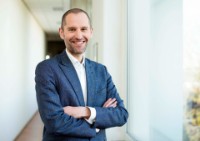
Als theoretisch psycholoog wil Stephan Schleim niet alleen het naadje van de kous weten, maar ook waar de wol van de kous vandaan komt. Hij analyseert de vooronderstellingen van onderzoek en bekijkt wetenschappelijke trends vanuit een ander perspectief. Zoals die van breindoping. Lees meer
Lijm voor de longen
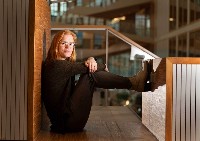
Hoe kan het dat een gekko zo mooi aan een plafond blijft hangen? En waarom blijft een mossel zo goed plakken onder water? De raadsels van de natuur zijn een bron van inspiratie voor Marleen Kamperman. Zij wil nieuwe materialen maken én op de markt brengen. Zo kan het gebeuren dat een arts over een tijdje een beschadigd stuk long dicht kan kitten. Lees meer
Wetenschapswinkels: een brug tussen universiteit en samenleving
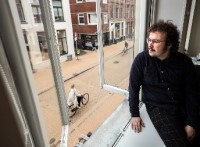
Een wetenschapswinkel. Wat koop je daar? Een broodje kennis? Een wisdom-smoothie? Bacteriën op bestelling? Het aanbod van wetenschapswinkels is niet voor iedereen even duidelijk. Terwijl ze zo belangrijk zijn - voor samenleving, onderzoeker en student. Ze bieden organisaties een kans onderzoek uit te laten voeren door studenten. Hierdoor wordt het academische onderzoek en onderwijs verbonden aan maatschappelijke kwesties. Voor alle betrokkenen een buitenkansje. Lees meer
Hoe menselijke vooroordelen in computerprogramma's sluipen
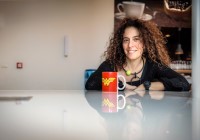
Taaltechnologie heeft in de afgelopen jaren zo’n ongekende ontwikkeling doorgemaakt dat de toepassingen ervan - denk aan autocorrect, Google Translate en Siri - niet meer zijn weg te denken uit ons dagelijks leven. Maar gebruikers staan nauwelijks stil bij de actieve rol die ze zelf spelen in deze technologie, en ze zijn zich te weinig bewust van de risico’s die gepaard gaan met de ontwikkelingen, zegt prof. dr. Malvina Nissim, hoogleraar Computationele Taalkunde en Maatschappij. Op 2 december houdt zij haar oratie. Lees meer
Polarisatie: van weerstand naar verbinding
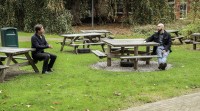
Steeds meer mensen zijn het vertrouwen kwijtgeraakt in de informatie van de regering, academici en beleidsmakers. Ze zien regelgeving niet meer als een oplossing voor hun problemen. Op vrijdag 18 november organiseert de Rijksuniversiteit Groningen (RUG) daarom de Meet & Greet Perspectives on polarization. De RUG wil zo kennis uitwisselen en verschillende visies op polarisatie bij elkaar brengen. De vraag die het evenement aanstuurt: hoe kunnen we de samenleving van de toekomst vormgeven? Lees meer
Een wetenschapsprijs winnen – met een balletje???
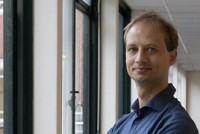
Op 25 oktober draaide een bingomolen in de Groningse Universiteitsbibliotheek. Daaruit vielen drie balletjes, waarmee de winnaars van de UG Open Research Award 2022 bekend werden. De gelukkigen krijgen een geldbedrag en mogen case studies van hun onderzoek op 17 november presenteren tijdens een event over transparantie in de wetenschap. Juryvoorzitter Maurits Masselink licht het waarom van de loterij toe. Lees meer
Gezocht: gids uit de chaos in de binnenstad
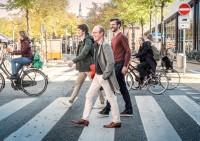
In onze hedendaagse on demand -economie - vandaag besteld, morgen in huis, winkel of restaurant - zijn we volledig gewend aan snelle levering. Maar fijne middelgrote Europese steden dreigen vast te lopen door de explosieve groei van verkeersstromen. Drie RUG-onderzoekers spraken vervoerders, ondernemers en beleidsmakers in Groningen, Mechelen en Bremen. Het leidde tot zes toekomstscenario’s en een stevige waarschuwing: ‘De route naar duurzame stadslogistiek loopt over een smal pad. Zonder regie van de lokale overheid gaat het niet.’ Lees meer
Bijdragen aan de 'gouden' rolstoelatleet
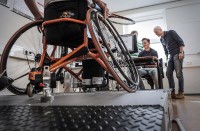
Goud winnen op de Spelen. Het is de droom van menig paralympisch sporter. Hoe slaag je daarin? Bewegingswetenschapper Riemer Vegter draagt daar een steentje aan bij en zorgt ervoor dat sporter en rolstoel zo goed mogelijk op elkaar aansluiten. Met het project WheelPower willen de grootste paralympische rolstoelsporten kennis uit de praktijk en de wetenschap onderling delen. Vegter: ‘Je leert het meeste over menselijk bewegen wanneer je onderzoek doet in situaties waar het lichaam niet langer functioneert zoals het meestal doet.’ Lees meer
Recyclebare plastics voor een duurzame toekomst
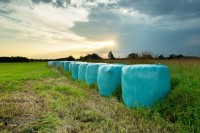
Chongnan Ye werkt in de groep van Katja Loos aan nieuwe, duurzame materialen. Hij legde voor zijn promotieonderzoek een ‘bibliotheek’ aan van kansrijke, biobased moleculen. Het onderzoek is een unieke samenwerking tussen de RUG en NHL Stenden in Emmen. Deze samenwerking is onderdeel van de Universiteit van het Noorden. Lees meer
Hoe je woonwijk je kansen bepaalt
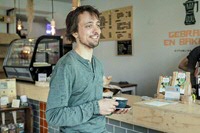
Het valt wel mee met die crisis, dacht Sander van Lanen in 2009, toen hij als stagiair bij Boomerang werkte. Het besef dat het niet mee viel kwam in 2011 in Athene, waar hij demonstranten op het Syntagmaplein sprak. ‘Dat is het moment dat ik geïnteresseerd raakte in de vraag wat crisis deed met verschillende plekken en verschillende mensen.’ Van Lanen kent inmiddels de problemen, maar ook de kracht van achterstandswijken. Lees meer
Gebruik van kunstmatige intelligentie in oorlogen
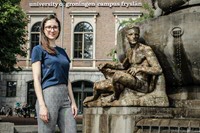
De mogelijkheden van kunstmatige intelligentie (AI) ontwikkelen zich snel en hebben invloed op bijna alle, zo niet alle sectoren van de samenleving. We zijn min of meer gewend aan de civiele toepassingen van AI, zoals beeldherkenning om smartphones te ontgrendelen, spraakassistenten die ons vertellen wat voor weer het is, of het nieuwe Instagramfilter dat je vriend zojuist heeft gebruikt. Deze systemen zijn echter ook geïmplementeerd in toepassingen die velen van ons minder goed kennen. Bijvoorbeeld militaire. Taís Fernanda Blauth onderzoekt de juridische aspecten van deze toepassingen. Ze geeft een korte beschrijving van kwesties rondom autonome wapens. Lees meer
Dierprocessen in de middeleeuwen: bij de beesten af?
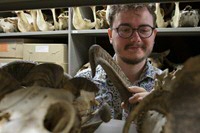
Slakken die plechtig verbannen werden omdat ze te veel geknabbeld hadden aan gewassen. Dolfijnen, paarden, mollen en vliegen die in de rechtbank gevonnist werden. Sven Gins onderzoekt dergelijke dierprocessen in de middeleeuwen. Weliswaar hebben wij nu Dierendag en zelfs een Partij voor de Dieren, maar zijn wij humaner? ‘Middeleeuwers zouden zich waarschijnlijk evenzeer verbazen over onze omgang met dieren in de industrie en in de natuur.’ Lees meer
Virtueel sollicitatiegesprek brengt stress in kaart
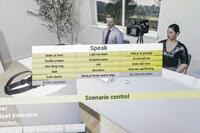
De afdeling Psychiatrie van het UMCG doet onderzoek naar stressweerbaarheid en maakt daarbij gebruik van virtual reality om de impact van stress goed in kaart te kunnen brengen. Daarmee kun je op een gecontroleerde manier een stressvolle situatie creëren. Het visualisatieteam van het Centrum voor Informatie Technologie ontwikkelde hiervoor een setting in de vorm van een virtueel sollicitatiegesprek. Lees meer
Wie waren de lezers van de middeleeuwen?
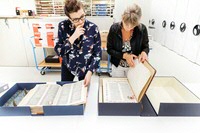
Sabrina Corbellini. hoogleraar aan de Faculteit der Letteren, onderzoekt de geschiedenis van het lezen in premodern Europa. Haar onderzoek ontkracht hardnekkige vooroordelen over de donkere, onontwikkelde middeleeuwen. “Kunnen lezen is essentieel voor het functioneren van een maatschappij. Dat was zo in de middeleeuwen, en dat is nu nog steeds zo.” Lees meer
Een robot die voor je schoonmaakt? Een heel denkbaar scenario!
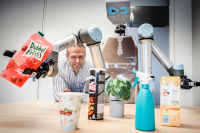
Een robot die stofzuigt, opruimt en het vuilnis buitenzet: al toen de eerste robots werden ontwikkeld was dat de droom van velen. Het leek lang vooral toekomstmuziek, maar volgens robotonderzoeker Hamidreza Kasaei is deze werkelijkheid dichterbij dan je denkt. Lees meer
Alumnus van het Jaar Iris de Graaf
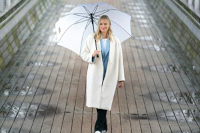
Iris de Graaf, Ruslandcorrespondent bij de NOS, is de Alumnus van het jaar 2022. De Graaf ontvangt haar prijs op 5 september, tijdens de opening van het Academisch Jaar. De Russische inval in Oekraïne laat opnieuw zien hoe belangrijk het is dat er onafhankelijke journalisten zijn als zij, die de feiten kennen, duiding geven aan ontwikkelingen en het kaf van het koren kunnen onderscheiden. Lees meer
Een gemijterde prelaat op een zeug
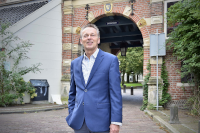
Historicus Joop Koopmans doet onderzoek naar de rol en de invloed van de media in de vroegmoderne tijd. Hoe berichtten bijvoorbeeld de kranten, spotprenten en pamfletten in het Rampjaar 1672 over Bommen Berend? Tijdens de Alumnidag hield hij er, ter gelegenheid van de viering van 350 jaar Groningens Ontzet, een publiekslezing over. Lees meer
